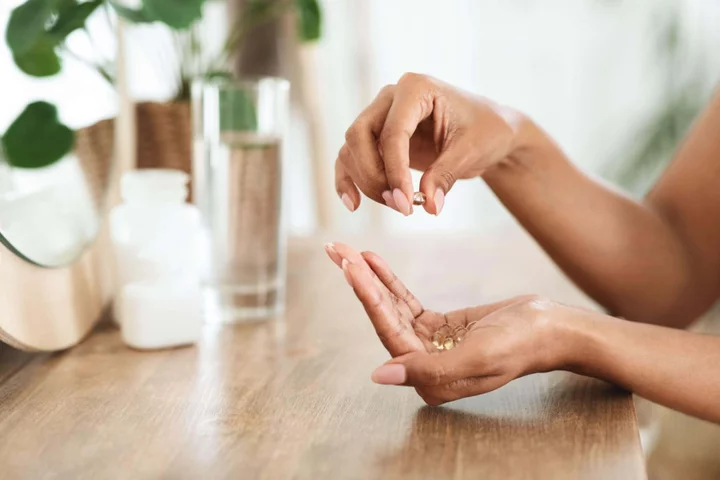
The vitamins to prioritise as the seasons change
If your social life has ramped up now that it’s spring, it can be easy to let the little things you do for your health slip a bit. But it’s just as important to ensure you get all the right vitamins and minerals as the seasons change. So what should we be prioritising right now? Vitamin D You may be getting more sunlight now but it is still important to maintain good levels of vitamin D. “Levels of vitamin D will be low at the end of the winter and moving into spring”, Public Health Nutritionist Dr Emma Derbyshire from the Health & Food Supplements Information Service (HSIS) says. “Vitamin D is important for the absorption of calcium and healthy bones and teeth as well as for immune function. “The UK government recommends that we all take a 10 microgram daily supplement throughout the year but especially in winter through to spring. If you haven’t taken vitamin D throughout the winter your levels will likely be low, so top up now with a supplement.” Vitamin C “Vitamin C is a powerful antioxidant,” says Derbyshire. “With warmer weather you will be spending more time outside with more exposure to the outside air. “Vitamin C protects cells from the oxidative damage caused by pollutants. [It] also helps with the absorption of iron. Many women are short of iron particularly during their reproductive years so boosting vitamin C intake helps to reduce the risk of iron deficiency and the tiredness and fatigues that can cause.” You can find it in citrus fruits, tomatoes and peppers. “For those finding it hard to eat their five fruit and vegetables a day, then I would recommend taking a multivitamin and multimineral supplement to ensure your body is fuelled with an a-z of vitamins and minerals including vitamin C and iron,” Derbyshire adds. B vitaminshttps://twitter.com/johnnyxbrown/status/1650549580080066565 B vitamins include thiamin (vitamin B1), riboflavin (vitamin B2) and vitamin B6, niacin (vitamin B3), pantothenic acid, vitamin B6 (also known as pyridoxine) and biotin (vitamin B7). “Vitamins B one, two and niacin help release energy from food and are essential for the health of the nervous system,” says Derbyshire. “[This season] we want to feel energetic and for our nerves to be healthy so that we can best enjoy all the activities we have missed over the winter. These B vitamins help to reduce tiredness and fatigue.” Look for thiamin in peas and nuts, riboflavin in eggs and mushrooms, niacin in meat and wheat flour, and pantothenic acid in avocado and liver. Vitamin B6 can be found in pork, peanuts and bananas, but we only need very small amounts of biotin and the NHS say it’s not clear if we need additional biotin from our diets or supplements. Vitamin B12 Though it is a B vitamin, it is important to look at vitamin B12 independently, says Derbyshire, as it impacts so many different aspects of our health. “Vitamin B12 is essential for several issues we need help with in the spring – from immune function to tiredness and fatigue. “Spring is also a time when you might decide to cut back on the stodgier foods of winter. You might opt for a plant-rich diet which is healthy but if you cut out meat and other animal-source foods you are at risk of vitamin B12 deficiency. “If you decide to make a change to your diet this spring take a multivitamin supplement to make sure you are topped up with the nutrients that could be missing from your diet,” adds Derbyshire. Folate “Folate is vital for immune function which may have taken a battering by springtime. It’s also important for reducing tiredness and fatigue,” says Derbyshire. “Top up your levels by eating kale, broccoli, spinach, chickpeas and a supplement containing folic acid.” Read More Charity boss speaks out over ‘traumatic’ encounter with royal aide Ukraine war’s heaviest fight rages in east - follow live 5 top tips to increase the chances of selling your property faster Drag queen Ella Vaday plans on ‘bringing camp to the campsite’ in 100km trek A beginner’s guide to topiary
2023-05-16 20:50

Taco Bell is fighting to cancel the 'Taco Tuesday' trademark
Taco Bell wants to liberate the "Taco Tuesday" trademark from a smaller, rival chain.
2023-05-16 20:20

Airlines See Summer Boom Led by Asia’s Post-Covid Comeback
Air travel bookings are pointing to strong demand this summer, with Asia Pacific leading a regional rebound after
2023-05-16 19:56

What is the Ukraine grain deal and will it be renewed?
A UN-sponsored deal which let Ukraine continue exporting grain despite the war is due to expire.
2023-05-16 19:23
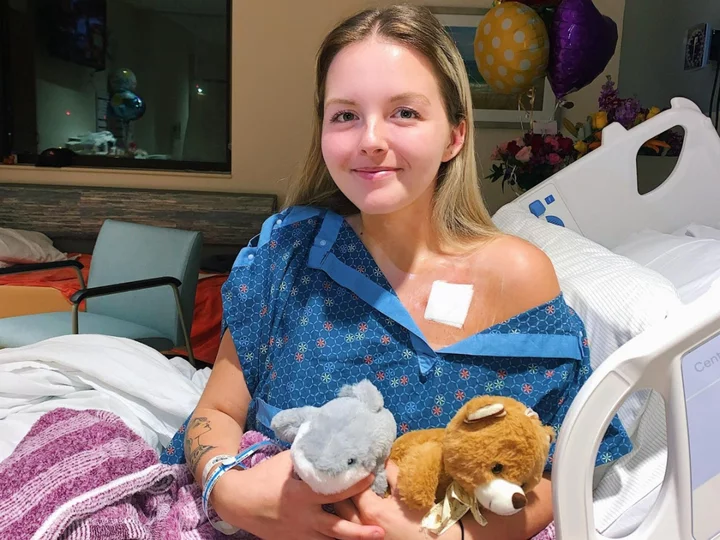
Teacher, 25, rushed to hospital with stomach ache diagnosed with terminal cancer
A woman who lost her hair to stage four cancer at just 25 had a sun tattooed on her head as a “f*ck you” to the disease. Madison Baloy was diagnosed with adenocarcinoma, a type of cancer that forms in the glandular tissue, in March 2023 after experiencing stomach aches for a year. The former kinder garden teacher was at a music concert with her friends in June 2022 when she started experiencing stomach aches. Over the course of 2022, she lost 60lbs and her tummy pain become more consistent, but she didn’t think anything of it. Madison was teaching in her classroom when she started feeling nauseous and called in the school nurse who told her to go to the emergency room. Madison was told she might have cancer and underwent a CT scan at, HCA Florida Brandon Hospital, Florida, which revealed a cluster tumours pushing down on her large intestine, causing the stomach aches. After an emergency surgery and a biopsy in February 2023, Madison was diagnosed with stage four adenocarcinoma cancer in March 2023. Her cancer can be managed but not cured so she will be living with the disease for the rest of her life. In what she describes as a “f*ck you” to the disease, Madison got a sun tattoo on her head - after losing her hair to the disease. The tattoo took an hour to complete with Madison saying it wasn’t painful. Madison, a former kinder garden teacher who had to give up work due to her illness, from Tampa, Florida, US, said: “Some of my attitude towards cancer is probably naivety. Being 25 and not being able to come to terms with being terminal. “In America, we idolise hustle culture and I was heavily into that culture and prioritised being the best teacher I could. “My diagnosis had made me idolise things differently. “When I first started losing weight, I thought it was god answering my prayers. “I thought the universe was giving me the perfect body - but I was dying and none of us knew. “When I got diagnosed my family were in the hospital room with me, I had a jokey reaction and said my doctor should be paid for giving people bad news. “I said I had no idea why everyone was crying as I would get the coolest head tattoo ever after losing her hair to the disease. “I am in a ‘f*ck it’ mentality. Honestly, what is the worst thing that is going to happen?” Madison was at Bonnaroo Music Festival, in Manchester, Tennessee, US, in June 2022, when she started feeling unwell. While dancing along to Stevie Nicks with her friends, Madison started experiencing stomach aches but put it down to dehydration and being out in the sun all day. After the festival had finished, Madison continued to experience pain in her stomach, which would come in bursts, either lasting a few seconds or a few minutes, but didn’t think anything of it. Madison said: “Over the course of a year, I lost around 50 to 60lbs and had pretty consistent stomach aches. “During President’s Day weekend, my stomach aches were there, and I started getting nauseous. “I went back into school on Tuesday and tried to push through but, on Wednesday I got sick and had to call the school nurse who told me to go to urgent care.” When Madison arrived at Express Care of Tampa Bay medical centre, a nurse told her her stomach aches could be due to cancer and told her to go to the emergency room. After arriving at HCA Florida Brandon Hospital, Florida, Madison was put into a wheelchair and examined. Her CT scan revealed a cluster of tumours pushing down on her large intestine, causing stomach aches. Just 48 hours later, on February 24, 2023, surgeons performed emergency surgery and did a biopsy which revealed Madison had stage four cancer and she spent 10 days in the hospital recovering. Madison said: “They found that I had adenocarcinoma cancer - cancer that forms in the glandular tissue - and found it was spreading around my body. “The biggest struggle has been my body image because I was happy and healthy. “I was 25 years old - I was in my prime, I was teaching, making good money, going out with my friends - I felt amazing. “Then it all flipped and now I have no hair and all these scars on my stomach from the surgery.” Due to the nature of her cancer and how advanced it is, Madison will never be considered cancer-free, but her cancer can be managed. She said: “Now, I am collaborating with two cancer centres in Florida. “My primary cancer clinic is Florida Cancer Specialists, where I have a family of oncology people who take such amazing care of me. “We also work with Moffitt Cancer Center for additional testing and second opinions. “I will have this forever - the best outcome long term is that I will be able to live and take a pill every day and just got in for regular appointments. “It is hard, it is super hard. The hardest part is the reality shift I have had but it hasn’t got me down as much as I thought it would. “I am doing chemotherapy every three weeks and it has been working in the sense that it’s keeping my cancer at bay.” When she received her diagnosis, Madison was surrounded by her family and decided to make light of the situation. “When I got my diagnosis, my family was with me, and I thought I was going to be told I had Crohn’s disease. “My surgeon comes in - wearing his street clothes - and I started joking that he was handsome. “He is looking very serious, and he comes to sit on the edge of the bed, and I told him to buy me dinner first. “He then told me I have stage four cancer and I said I didn’t understand why people were crying as I am gonna get the coolest head tattoo ever.” Madison got her head tattoo on May 4, 2023. She said: “I called my tattoo guy, Nick, and asked about his availability. “I decided on what I would get the night before, I wanted the sun on my head. “I don’t know where I was coming from, but I wanted to get something happy.” Read More Janey Godley shares heartbreaking cancer update as husband reacts: ‘I thought he was being sick’ Woman diagnosed with skin cancer after spotting telltale sign in selfie Hairy Bikers star Dave Myers says one food has helped him return to work after cancer treatment Janey Godley shares heartbreaking cancer update as husband reacts Hairy Bikers’ Dave Myers says one food has helped him with cancer recovery Mother left ‘looking like Freddy Krueger’ reveals first skin cancer warning sign
2023-05-16 17:55
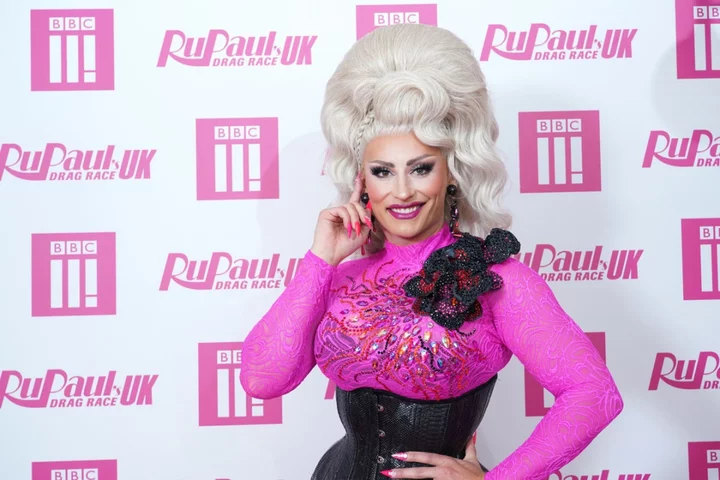
Drag queen Ella Vaday plans on ‘bringing camp to the campsite’ in 100km trek
RuPaul’s Drag Race star and actor Nick Collier, who performs as Dagenham drag queen Ella Vaday, is embarking on a 100km trek with CoppaFeel! alongside celebs including Frankie Bridge and Giovanna Fletcher. The 100km trek is raising funds for breast cancer support, and as his mother has been suffering from breast cancer since 2021, Collier is eager to do his bit.The Drag Race runner-up is really close to his mum. “I am the eldest of three, and me and my mum are very similar in many ways. I left home at 16 to train in dance and musical theatre, but I am always looking out for my mum.” “She has had breast cancer since 2021. She’s actually just finished her treatment and she is nearly there with injections,” he explains. The opportunity to take on this adventure and raise some funds “came at a really great time,” for Collier. “It’s nice to celebrate my mum, as she has had cancer for a second time. This is my way of giving back, celebrating her journey and also putting myself to the test and raising some money.” Many may be thinking the hardest part of this trek would be the actual walking, but as a former dog walker and fitness fanatic, Collier isn’t worried about the fitness aspect, instead, his concerns are “the weather and… sleeping in a tent. I am not looking forward to that, but I am bringing the camp to the campsite,” he jokes. This year, he has taken some time to really focus on his fitness and wellbeing, and is “in the gym five days a week,” improving his strength and stamina as a performer. Since he trained as a performer at Bird College, he has been keen to look and feel good. Collier has faced the physical demands of Drag Race and taken on that challenge, reaching the final. And, with hindsight, he sees just how intense and physical that challenge was. In the competition, he flawlessly impersonated much-loved British culinary sensation Nigella Lawson, performed showstopping live vocals and even dressed up as a striking Dagenham Ford worker. “It was so full on, so intense. You don’t see half of what goes on, with the early mornings and long days, the lack of connection to the normal world. There are elements of mental and physical fatigue,” Collier shares. “It was the best experience ever and I feel like the trek will be similar.” But, ahead of the finale, disaster struck Collier as he sustained an injury to his back. “I was injured for the finale and the morning of the finale I couldn’t even put my socks on, but I had no choice but to get through filming. “That was a moment I had to fight through, to be able to get home to see my partner, Marco, and my family.” Having performed on the West End for several years in shows including The Book Of Mormon and Wicked, while also running his dog-walking business, Collier is no stranger to hard work. His resilience and ability to push through tough times is a trait Collier is proud of, one that will support him in his trek and one that he believes he has really acquired as an LGBTQ+ person. “We have always been faced with obstacles, the first being having to come out, which really sucks,” he explains. “The fact I have to tell people what my sexuality is, is an obstacle. Discovering your identity when you are put in a box, is an obstacle to overcome.” He has also found that despite the acceptance of LGBTQ+ people in the entertainment industry, “in the acting world, as an outwardly gay person, it is hard to get chosen for straight roles and it is really frustrating sometimes,” he explains. This June, Nick Collier will be completing the ‘CoppaTrek! with Gi’ in Hadrian’s Wall Country alongside Giovanna Fletcher, to raise vital funds and awareness for breast cancer charity, CoppaFeel! To donate, please visit coppafeel.org/give. Read More Charity boss speaks out over ‘traumatic’ encounter with royal aide Ukraine war’s heaviest fight rages in east - follow live A beginner’s guide to topiary Irish premier Leo Varadkar’s partner apologises for ‘poor judgement’ coronation posts 9 actually useful things you can do to support teens this exam season
2023-05-16 15:52
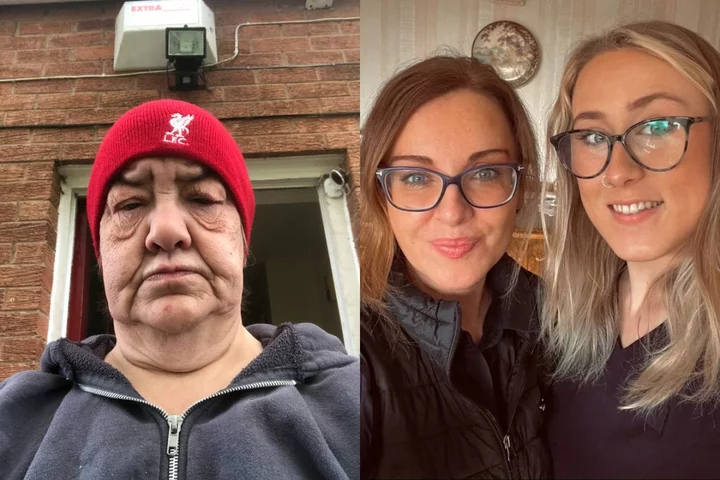
Woman says Specsavers saved her life with routine eye test
A woman who was left “severely epileptic” following multiple brain surgeries and whose seizures often leave her “black and blue” has said “Specsavers saved (her) life” as she had four unexpected and “frightening” convulsions during a routine eye examination and they were able to deliver first aid in her home. Jackie Rice, 56, who lives with her partner of 13 years Louise Cartwright, 55, who is paralysed and uses a wheelchair, was diagnosed with epilepsy about three years ago. As a result of her condition, Jackie, who lives in Harrogate, North Yorkshire, said she takes up to 20 pills every day and does not leave her home as she is “too frightened” that she will have a seizure. She cannot cook as she may burn herself or “set fire to (her) place” if she has a seizure; she has lost her driving licence, and she often sustains severe bruising from “smashing (her) face and head” during convulsions. Her seizures often cause her to wet herself as well, which she said is “embarrassing”. Because she is afraid to leave the house, she is reliant on the support of remote services, such as the Specsavers home eye tests, and is visited by a carer once a week . It was during a recent sight test visit that she had several epileptic seizures and started “banging her head against the wall”. Although she has no memory of it now, she believes she “would have been dead” if the Specsavers team had not visited her home that day. “They saved my life,” Jackie said. “My partner was in a different room, waiting for a carer, so she couldn’t help – it was awful. “I would have been dead – there are no two ways about it because there was nothing Louise could have done.” Nearly three years ago, Jackie said, Louise found her “unconscious in bed” as she had “collapsed”. After being taken to hospital, it was discovered Jackie had a hearing infection and three abscesses on the brain, which she believes were left undetected for a while. Jackie, who does not have any children and no longer works, remained unconscious and underwent three brain surgeries before waking up at Leeds General Infirmary (LGI) three weeks later. She said the procedures have left her deaf in her left ear and severely epileptic, and she now has about one seizure per week. “Four weeks after I had to put my dog to sleep, that’s when Louise found me,” Jackie said. “When I came around, I didn’t know where I was, I didn’t know who I was, or anything. “Because of the operations on my brain, it sent me delirious.” Jackie said she was told she tried to climb out of a hospital window during the recovery period, and she was not discharged until three months later. As a result of her epilepsy diagnosis, Jackie said she now takes up to 20 pills every day, and only leaves the house, accompanied by a carer, for necessary appointments or check-ups. Jackie said she does not know what triggers her seizures, but they often leave her “black and blue”. “The seizures come out of nowhere,” Jackie said. “I’m just recovering from a seizure at the moment – I have black eyes, a busted head and a banged-up face. “I’m black and blue again.” She said she spends her days with Louise, playing Candy Crush on her phone and watching sport on TV – she is a huge Liverpool Football Club fan. She is reliant on remote services to help her look after her health and wellbeing, but she never anticipated that she would have multiple seizures during a recent eye examination at home with Specsavers. All she can remember is starting the eye test and then “coming round in hospital three days later”, which she said was “very scary”. “It really does scare you when you wake up,” Jackie said. “I just thought, oh, where’s Louise? What’s happening? “You have no recollection of where you are.” Domiciliary optometrist Paula Conway, 52, who works for Specsavers based in York, covering the North Yorkshire area, remembers the day vividly. She and her optical assistant Charlotte Wilson visited Jackie’s home on January 13 for the routine eye examination. Just days earlier, on January 9, Paula explained that they had undergone first aid training from instructor Karl Whittaker at St John Ambulance. Little did Paula know that this training would be invaluable when visiting Jackie, as Karl talked in depth about what to do in the event that someone has a seizure. “I was about to proceed with the sight test and, all of a sudden, she just started rocking backwards and forwards, and I just thought, oh, this looks like a seizure,” Paula said. “She started to bang her head against the wall, so I managed to get a cushion behind her, and I knew I had to move all the objects out the way.” Paula said Jackie had four seizures “one after the other”, but with the support of Charlotte, they were able to put a duvet cover down on the floor to protect her. They then placed her in the recovery position while she was unconscious and called for an ambulance, after which paramedics arrived and took Jackie to hospital. While Paula and Charlotte were able to “stay calm” and keep Jackie safe during her seizures, Paula said it was an “extremely frightening experience” and they “both felt quite shaken afterwards”. “I think it was just really lucky that we were there, and we knew how to handle the situation,” Paula said. “Without the first aid training, I really don’t know what we would have done, it could have been a completely different situation altogether.” While Jackie does not remember what happened, she said the team “saved (her) life” – and she feels “very lucky” that Paula and Charlotte were there that day. She has since given them a bouquet of flowers, as a token of her appreciation, and wants to raise awareness of the Specsavers home visits team and the importance of first aid training. “I’d like to say thank you to the team for saving my life and for looking after Louise,” Jackie said. “If they hadn’t have used first aid, I don’t know what would have happened to me, so I think everyone who does home visits needs to have first aid training. “I didn’t know I was going to fit that day, I never know, so it could have been a very different outcome.” For more information about Specsavers home eye tests, visit www.specsavers.co.uk/home-eye-tests. Read More Blind people at risk due to ‘inaccessible’ health information from NHS, charity warns WHO issues warning over using sweeteners for weight control How to check if you have skin cancer: Symptoms and signs to look out for Charity boss speaks out over ‘traumatic’ encounter with royal aide Ukraine war’s heaviest fight rages in east - follow live
2023-05-16 14:56

Drew Barrymore shares candid Mothers’ Day post about checking into rehab as a teen
Drew Barrymore has shared a “vulnerable” post about entering rehabilitation treatment at just 13 years old in honour of Mothers’ Day. On Saturday (May 13), the 48-year-old Hollywood star reflected on legally emancipating herself from her parents after a two-year stay at a drug rehabilitation center. In her blog post, the Drew Barrymore Show host also explained how growing up in the spotlight has influenced how she parents her own children. “When I got emancipated by the courts at 14 years old, the umbilical cord was severed, and I have not been the same since,” the Charlie’s Angels star wrote. “It was necessary for me to step away and start to become my own person. And at the age of 14, my own parent.” Barrymore shared that her mother – Jaid Barrymore – admitted her to a youth program for drug rehabilitation when she was 13 years old. The hospital, called Van Nuys Psychiatric, was located in Los Angeles, California. “Once the door shut behind me, my stay lasted almost two years,” she said. “I was in for the long haul. I bonded with a lot of the kids, because like me, they did not know where to put their anger and they did not know how to live life anymore without the need to get high or self-destruct in some form and fashion.” The Never Been Kissed star explained how the rehab center was a “revealing and healing” experience, from meeting with therapists to learning how to set boundaries. “Kids love feeling safe, and having boundaries is one of those crucial bumper rails,” she wrote. “I lived a boundaryless life and job. And this place, as hellacious as it was, it was exactly what I needed from the too much excess my life had become on the outside. “ Her two-year stint at the rehab center also taught Barrymore how to process her own emotions and understand the “foundations of telling your truth”. “Your feelings. Your faults. Your hopes and wishes. Your hurts. What and where you wanted to get to in life. And – very important – who was going to help you on your path and who would you have to let go,” she said. “For me, at the end and when I got out, it was my mother.” Despite winning emancipation from her parents at just 14 years old, Barrymore described how she “found family” in her friends and colleagues. Now, Barrymore has two daughters of her own – Olive, 10, and Frankie, nine – whom she shares with ex-husband Will Kopelman. Still, becoming a mother has brought up her own feelings about her rebellious childhood. “Being a mother constantly triggers everything from my own childhood now,” Barrymore wrote. “I live in an often-petrified state of thinking about my past and wanting to have things different for them. I want them protected. I want them to grow up slowly. I want family around and traditions and rules and boundaries.” While the 50 First Dates star went on to say that motherhood has been the “greatest thing I will ever do in my life without question,” she admitted that she still needs “to continue to figure things out” so that she can “disembark from my past and live in the present”. Barrymore concluded her candid blog post by describing a recent conversation she had with her own mother on Jaid’s birthday: “I texted her. It simply read ‘Happy birthday, Mom,’ and she wrote back, ‘Thank you so much! I’m incredibly proud of you and send you love.’” “It was the biggest gift I could have ever received. To know that she is proud of me,” the actor wrote, before adding a sweet message to her own daughters. “And to my girls… I just hope I can be someone who makes you feel safe. And that you can laugh with. And that you can tell me anything. I’m here for it. I’m in the circle with you… for life.” On Instagram, fans applauded Drew Barrymore for sharing the “open and raw” blog post. “Thank you for being vulnerable and sharing,” said one fan, while another wrote: “You are beyond inspiring.” Drew Barrymore has often spoken about her complicated childhood, ever since she rose to fame in Steven Spielberg’s ET the Extra-Terrestrial when she was seven years old. The child star, whose father John Drew Barrymore was also an actor, has since published multiple memoirs about her experiences with addiction as a teenager, including 1990’s Little Girl Lost and 2015’s Wildflower. In a 2015 interview with The Guardian, Barrymore referred to the youth treatment center at Van Nuys Psychiatric hospital as an “institution”, and revealed that it was the rehab center professionals who suggested she legally separate from her mother and be declared an adult at 14. “It was a very important thing to experience for me. It was very humbling, very quieting,” Barrymore recalled at the time. “Maybe it was necessary, because I came out of there a more respecting person. And my parents didn’t teach me that, and life wasn’t teaching me that. I came out in a very different way… but I still was me.” Most recently, Drew Barrymore shared in an essay last November that giving up alcohol has been “one of the most liberating things in [her] life”. The Ever After star, who previously revealed she hasn’t drunk alcohol in four years, reflected on how important it’s been for her to prioritise herself, even when it has felt “selfish” to do so. “Maybe our definition of love changes throughout our lives, but I truly believe so much love goes outward,” she wrote. “One of the bravest things you can do is slay those dragons and finally change an awful cycle in which you’ve found yourself stuck. For me, it was to stop drinking.” Read More Drew Barrymore mocks her viral dancing in the rain video in Wednesday-themed skit Drew Barrymore reveals she hasn’t been in a relationship since she stopped drinking alcohol Drew Barrymore admits to having a ‘boring’ sex life: ‘I’ve tried everything’
2023-05-16 02:51

Rebel Wilson celebrated Mother's Day with new pics of her baby
Rebel Wilson celebrated her first Mother's Day with her 5-month-old daughter, Royce.
2023-05-15 22:54
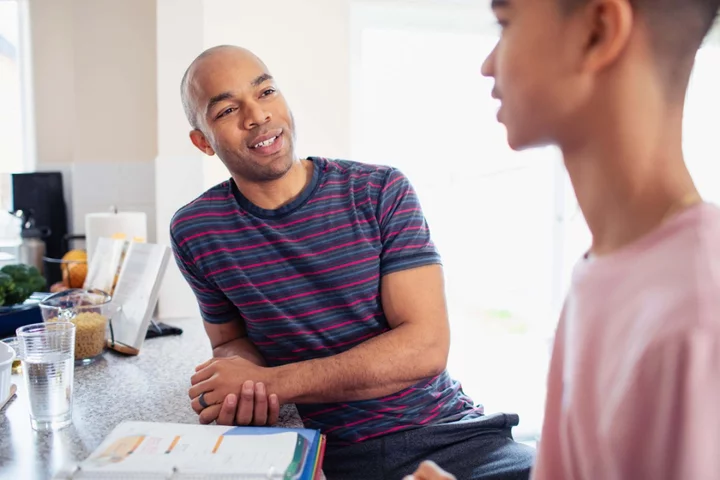
9 actually useful things you can do to support teens this exam season
Exam season is underway, and many teenagers might be feeling overwhelmed about the important tests they’re facing over the next few months. “Sitting exams is often one of the most overwhelming and high pressure experiences teens face, and students often put immense pressure on themselves,” says Lara McIvor, a revision expert at Save My Exams. “For parents with children taking exams, it can be difficult to know how best to support their child without being too involved or under-supportive. “As parents and teachers, it should be our mission to ensure students have access to clear support systems, coping mechanisms and study techniques over these challenging few months, and we should all be better educated in the warning signs of stress in teens.” And Matt Buttery, CEO of the Triple P Positive Parenting Programme, adds: “This can be a stressful time, but the good news is that parents can support young people and help remove some of the pressure around exam season. By setting a positive example and encouraging them, you can help ensure they remain happy and healthy, as well as reach their full academic potential.” So what can parents and carers do to actually make the whole exam experience better for teens? 1. Encourage them to chat with you Encourage open communication, and if your teen seems stressed, ask if they’d like to talk through revision together, or more broadly discuss their concerns, suggests Buttery. “It’s important your child knows you’re there for them if they need you,” he stresses. 2. Set up a quiet study area Ensuring your child has an optimum place to study without distractions is vital to their success, McIvor says. “Often concentration can wane, so making sure there are limited external distractions – such as loud music or TV – will allow for the best results and prepare them for their silent exams,” she says. 3. Don’t just rush to make them feel better It’s vital to acknowledge what teenagers are feeling, rather than just trying to make it go away, stresses psychologist Dr Audrey Tang. “One of the most important things anyone can do is validate their right to feel as they do,” she explains. “We’re not very good at sitting with anxiety and often rush to try and make it go away or to feel better, and this can lead us to quick fixes which can include unhealthy behaviour choices such as not bothering to try, often led by unhealthy thoughts like ‘If I don’t try, I can’t fail’.” 4. Help teenagers unpack their feelings Encourage teens to analyse or unpack how they’re feeling about their exams and revision, advises Tang. “If we take a moment to respect our feelings, and try to unpack exactly what we’re worrying about, we may be able to work out what we need to do next,” she explains. For example, is your teen’s anxiety caused by them not understanding some things, and if it is, which specific bits are causing the problem? Or is it linked to knowing their parents are stressed and not wanting to add to it, and if that’s the case, are other services available? “When we begin to unpack our feelings, rather than suppress or deny them, we have a better idea of what action is going to help us the most,” Tang explains. 5. Help with visual prompts Creating an ongoing learning environment throughout the exam period is key, says McIvor. She suggests sticking notes with key quotes, equations, etc on them around the house in places where your child can always see them. “This can be really useful for some students as it allows for constant exposure to materials,” she explains. 6. Avoid ‘toxic positivity’ If a teenager says things like, ‘I’m so stupid’, or ‘I’m rubbish at everything’, it’s natural for parents to tell them they’re brilliant, observes Tang. “Unfortunately, this has the effect of not validating those emotions, and the opportunity to understand what they’re trying to say is lost,” she explains. “A better way to navigate that discussion would be to acknowledge the feeling with something like ‘I’m really sorry you’re feeling that way’, and asking for more information.” 7. Be a good role model Role modelling healthy ways to manage your own anxiety is hugely important, stresses Tang. “Why would you expect a young adult to listen to you if you aren’t showing in your own practice that what you’re suggesting works?” she asks. And Buttery advises parents to lead by example by staying positive and calm when talking about exams. “Avoid using phrases such as, ‘You must be nervous’,” he says, “As you may risk accidentally making an otherwise calm child more stressed. Children learn a great deal about how to manage their behaviour and deal with difficult situations from their parents. By demonstrating calm and resilient behaviour, parents can have a positive influence on their children’s ability to cope with adversity.” 8. Try stressbusting techniques together Tang suggests practising self-care or stressbusting techniques together, such as affirmations with deep breathing. One technique, she says, is to get your child to note down everything they need to do and its relative importance on a pie chart, where the size of the slice shows the importance of the activity. Then ask them to draw on a scale of zero in the centre, to 10 on the outside, where they are in each segment. “This gives them a visual representation of what they need to do, and where they are, as well as an indication of the areas they’re neglecting, and how important those areas are,” she says. “By having everything on one pie chart, it might feel a lot more manageable.” 9. Maintain the family routine Ensuring family dinners and other rituals remain part of daily life can help teenagers cope with exam stress, as routine is predictable and reassuring at a time of pressure and uncertainty. Maintaining structure can also help your child plan their downtime, stresses Buttery, who adds: “It’s important to ensure they’re taking time to relax and unwind, whether by watching their favourite TV show, playing a game, or hanging out with friends.” Read More Charity boss speaks out over ‘traumatic’ encounter with royal aide Ukraine war’s heaviest fight rages in east - follow live Children In Need removes Pudsey’s bandana to show not all challenges are visible Is your child too anxious to go to school? What’s the link between the menopause and anxiety?
2023-05-15 22:15
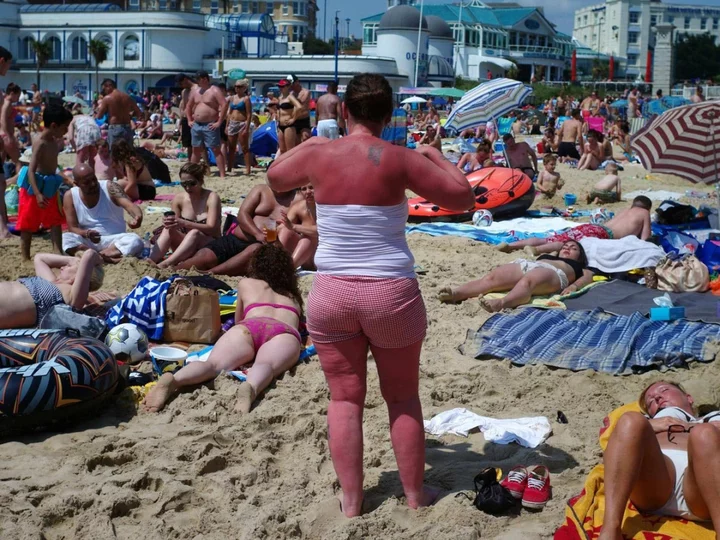
How to check if you have skin cancer: Symptoms and signs to look out for
It is the most common form of cancer in Britain and kills around 2,100 people in the UK each year, but still a “shocking” number of people remain unaware of the dangers of skin cancer, its links to sunburn, and how to spot the signs of this deadly disease. An overwhelming 77 per cent of people would not recognise signs of a melanoma – a malignant skin cancer tumour – despite the majority of Britons worrying about skin cancer, a new study by the British Association of Dermatologists (BAD) has found. There are two types of skin cancer; melanoma, the deadliest form of which around 13,000 new cases are diagnosed each year in the UK, and non-melanoma, of which there are more than 100,000 new cases diagnosed every year. The risk of melanoma is doubled if a person has had five or more sunburns at any age, the Skin Care Foundation states, but adds that experiencing just one blistering sunburn in childhood or adolescence more than doubles a person’s chances of developing a melanoma later in life. Non-melanoma comes in two most common forms: basal cell carcinoma, which accounts for about 75 per cent of skin cancers, and squamous cell carcinoma, which accounts for about 20 per cent. It is mainly caused by overexposure to UV light. But despite the serious risks of cancer posed from sunburn, nearly three quarters of people surveyed by BAD admitted to having been burned in the past year alone, while 40 per cent of people were found to never check themselves for signs of cancer. Here is how to check for possible signs of melanoma and non-melanoma skin cancer: Melanoma: The NHS states the first signs of a melanoma is often a new mole, or the change in appearance of an existing mole. Moles are usually round or oval, with a smooth edge, which is not bigger than 6mm in diameter. Any change in size, shape, or colour, any bleeding, crustiness or itchiness, or how painful a mole is should be shown to a doctor. The NHS has an ABCDE checklist to help people tell the difference between a normal mole and a melanoma: Asymmetrical – melanomas have two very different halves and are an irregular shape. Border – melanomas have a notched or ragged border. Colours – melanomas will be a mix of two or more colours. Diameter – melanomas are larger than 6mm (1/4 inch) in diameter. Enlargement or elevation – a mole that changes size over time is more likely to be a melanoma. Non-melanoma: Non-melanoma usually appears as a lump or discoloured patch of skin that does not heal. If a person experiences on of these patches that do not heal after four weeks, they should see their GP. Signs of Basal cell carcinoma can look like a small red or pink lump, though it can also appear as a pearly-white or waxy-looking lump, or it can also appear as a red or scaly patch of skin. The lump, whether pink or white, will grow slowly and can become crusty or bleed, or become a painless ulcer. Signs of Squamous cell carcinoma are the appearance of a firm pink lump. This lump could have a flat, scaly or crusted surface, often bleeds easily and feels tender to touch and can also become a painless ulcer. Read More UK skin cancer statistics 'shocking' Skin cancer referrals up 41 per cent in 5 years Wolverine star Hugh Jackman treated for skin cancer Cheap holidays blamed for huge rise in skin cancers
2023-05-15 19:16
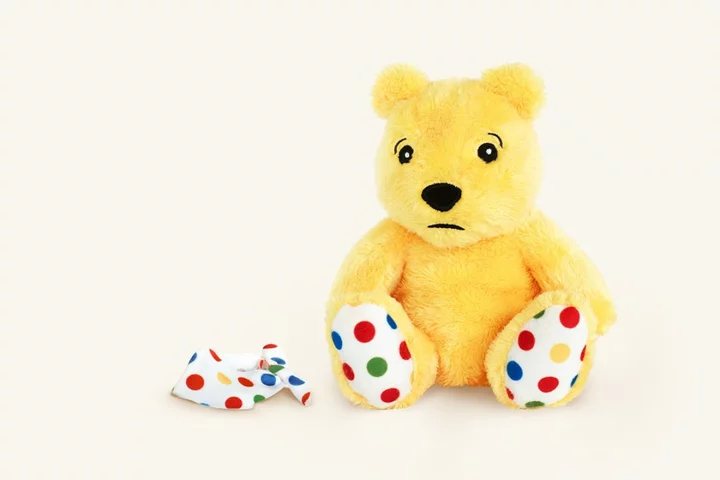
Children In Need removes Pudsey’s bandana to show not all challenges are visible
BBC Children In Need has launched a new Behind The Bandana campaign to mark Mental Health Awareness Week. The charity has temporarily removed mascot Pudsey’s eye covering to show “not all of the challenges that children and young people may be facing are visible”, the broadcaster said. The campaign encourages conversations between children and parents, carers and other trusted adults “to ensure no child faces their emotional and mental health challenges alone”. Former Love Island contestant Dr Alex George, who has campaigned for better mental health after the death of his 19-year-old brother Llyr by suicide in 2020, has been named Behind The Bandana ambassador. He said: “I know how important early intervention is in helping make a difference to the emotional wellbeing of children and young people and so I am very proud to be the ambassador of such a powerful campaign that really shines a light on the mental health crisis we are facing. “As highlighted by Pudsey bear himself, mental health issues can be less visible on the outside, but conversations and positive relationships really can help.” What’s also clear is that we can all play a role in addressing early signs of worry and anxiety by showing children and young people that we’re here to listen and to support them Simon Antrobus, Children In Need As part of the campaign, Children In Need has released the findings of a new Censuswide survey shedding light on how comfortable children feel when asking for help with their feelings and how often they feel the need to put on their “metaphorical bandana” and hide their emotions. While nine in 10 parents surveyed said they talk to their child about their mental health at least once a month, more than a quarter of young people surveyed said they had not talked to someone they trust about their mental health in the last six months. Children In Need’s boss Simon Antrobus said: “This research is a clear indication that our Behind The Bandana campaign is urgently needed. “What’s also clear is that we can all play a role in addressing early signs of worry and anxiety by showing children and young people that we’re here to listen and to support them. “By recognising and acknowledging that some feelings of worry and anxiety can be hidden means early conversations, sensitively delivered with kindness and empathy, can make a real difference to a child’s wellbeing and can help prevent mental health problems from becoming embedded.” Read More Charity boss speaks out over ‘traumatic’ encounter with royal aide Ukraine war’s heaviest fight rages in east - follow live
2023-05-15 17:21
